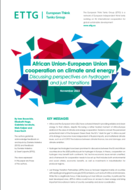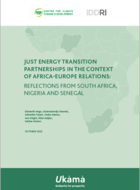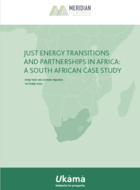The first COP of the Escazú Agreement is taking place from April 20 to 22, 2022 in Chile (Santiago). By giving a place to civil society and to the principles of environmental law, which it recognizes and strengthens, this agreement constitutes a real innovation in terms of environmental governance. However, its effective implementation by countries is a major challenge in a region where tensions in the environmental field are particularly high.
The Escazú Agreement was adopted on March 4, 2018, after two years of preparatory meetings and four years of negotiations involving significant public participation. It is the only binding agreement that arose from Rio+20 and the first environmental agreement to be adopted by the Latin America and Caribbean region. Entering into force on April 22, 2021 after ratification by twelve countries1 , it must now enter a new phase, that of implementation. The main drivers will be the region’s political dynamics and its civil societies.
Chile, the country where the process began, had not signed the agreement until recently due to the political changeover, but the first decision of the newly elected president, Gabriel Boric, was to sign it on March 18, 2022 and to launch the ratification process in Congress. Several countries, including Brazil, Colombia, Peru and Costa Rica, have signed the agreement but have not yet ratified it, although this could change following elections in Colombia and Brazil in 2022. Therefore, there will be three levels of participation at this first COP: State parties, signatory countries and observer countries.
An innovative agreement
The main value of the Escazú Agreement lies in the advances it contains regarding international environmental law in Latin America and the Caribbean, particularly in the application of Principle 10 of the Rio Declaration on Environment and Development, which emphasizes that “environmental issues are best handled with the participation of all concerned citizens, at the relevant level”2 . In this spirit, the active participation of the public in the negotiation process was instrumental in maintaining a high level of ambition and allowing key dimensions to be added to the text that were not initially envisaged. The agreement emphasizes the interdependence between human rights and the environment, is based on the principle of sustainable development, makes specific mention of the protection of environmental human rights defenders, and enshrines some important principles such as non-regression and progressivity. It also links environmental protection to equality and places the latter at the heart of sustainable development in its preamble.
The agreement also establishes obligations for cooperation between States and their citizens, but also between States, in terms of cooperation and capacity building. Among its main provisions, the Escazú Agreement recognizes the right of every person to live in a healthy environment (also recognized for the first time by the United Nations Human Rights Council on 5 October 20213 ), and the obligation to ensure that the rights recognized in the agreement are freely exercised. The Escazú text contains several provisions specific to the Latin America and Caribbean region, for example on the protection of environmental human rights defenders, and of people and groups in vulnerable situations. This is a significant issue in one of the world’s regions that is most affected by social-environmental conflicts and where there is a heightened risk to the lives and safety of individuals and groups acting as environmental human rights defenders. The agreement also enshrines the principles of non-regression (not stated in any national legislation in the region) and progressive implementation, which is relatively new in the context of international environmental law.
The political and technical challenges of the COP
The effective implementation of these different provisions by countries is a real challenge. This obviously requires a strong political will on the part of all actors, as it should be noted that the Escazú Agreement does not define the guiding principles and does not specify how the Parties should adopt them. In particular, this requires the adoption of legislative, regulatory, administrative or other measures to ensure the implementation of the agreement, the provision of information to the public to facilitate the acquisition of knowledge about access rights, and the duty to provide guidance and assistance to the public, especially to people and groups in vulnerable situations.
This is one of the main challenges of this first COP in Escazú: to agree on a framework that will truly enable countries to implement all provisions and to determine where the financial resources for its implementation will be found. To effectively maintain the ambition of Escazú, it is necessary to continue to give the public the same role in monitoring and implementation that it had in the negotiation process.
In response to the challenge of implementation, the Escazú Agreement made provisions to facilitate its implementation by State Parties, focusing on three key components: capacity building, cooperation and the evaluation of effectiveness. With regard to the first two, the objective is to enable Parties to fully implement access rights. But capacity building and generally the effective implementation of the agreement requires cooperation between Parties (South-South) (Article 11.1) as well as international cooperation (Article 11.4). It is a commitment to cooperate between countries in the region to strengthen the implementation of the standards of the agreement. It is an opportunity to exchange experiences, good practices, share and learn, and generate synergies with other regional and sub-regional processes.
This first COP will focus on the practical implementation of three articles included in the agreement: the rules of the agreement’s implementation, which will include modalities for meaningful public participation (Article 7); the funding necessary for the operation and implementation of the agreement (Article 14); and the establishment of a committee to support the implementation and compliance of the agreement (Article 18). In the collaborative spirit of experience sharing and capacity building of the aforementioned agreement, this committee appears to be the heart of the Escazú Agreement. Therefore, decisions of the Parties regarding the rigour and flexibility of the functioning of this Committee, as well as the role of civil society in advancing “communications for non-compliance”, will be crucial to the future of the Agreement.
It is also a sui generis COP, where representatives of civil society will be able to participate actively and directly alongside State Parties. This dynamic does not exist in other multilateral environmental frameworks and represents an advance and a potential precedent for other negotiations.
In addition, the Escazú Agreement stresses the importance of effectiveness in its Article 15.5, and as such provides for independent reviews that will be very useful in assessing progress and areas for improvement. These independent reviews are one of the conditions for the success of the agreement: they must assess the efficiency, effectiveness and progress of the environmental policies implemented by the countries regarding their commitments at the domestic level and in the framework of the agreement. The regional dynamics between the different stakeholders involved in these reviews, as a form of peer dynamics, will certainly be key to ensure that these assessments become levers to improve national environmental policies, and civil societies will have an important role to play in this regard.
- 1 Antigua and Barbuda, Argentina, Bolivia, Ecuador, Guyana, Mexico, Nicaragua, Panama, Saint Vincent and the Grenadines, Saint Kitts and Nevis, Saint Lucia and Uruguay.
- 2https://www.un.org/en/development/desa/population/migration/generalassembly/docs/globalcompact/A_CONF.151_26_Vol.I_Declaration.pdf
- 3A/HRC/48/L.23/Rev.1








